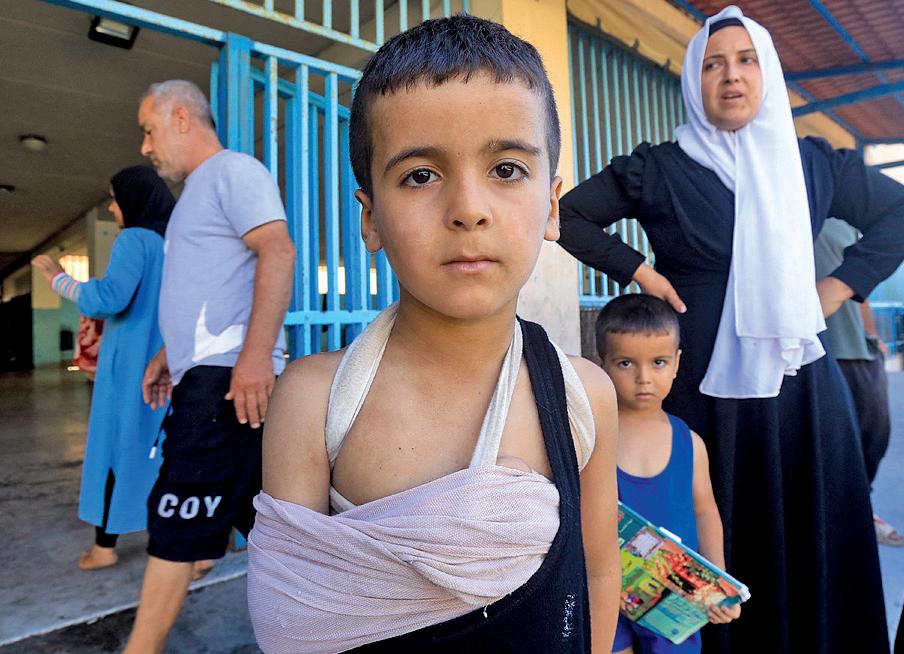
Like many arguments that attempt to justify Israel's disproportionate response to 7 October, it is not only incorrect but also an inversion of reality. The events of the last few months and the assault on Lebanon demonstrate that it is Israel which is a threat to its neighbours.
On one day last month, Israeli airstrikes killed 558 people in Lebanon. Among the dead were 50 children, as well as humanitarian workers, first aid responders and government employees. Lebanon's prime minister, Najib Mikati, says a million people could soon be displaced.
A Gaza in microcosm is quickly unfolding - thousands fleeing for safety, traumatised children, high casualties, an escalation where there is no limit on the civilian lives that can be sacrificed to achieve Israel's goals.
Since the start of the conflict in Gaza, Israel and Hezbollah have engaged in a war of signalling military capability, exchanging missiles and rhetoric but never open and unrestrained warfare. That changed with the pager and radio attacks, widely believed to be by Israel, followed by airstrikes. Israel is looking not just for a cowing of Hezbollah, but for military victory. But there is a risk that Hezbollah and Iran, which have so far refrained from a clearcut declaration of war, will be goaded into a face-saving conflict which neither they or Israel can win outright.
Diese Geschichte stammt aus der October 04, 2024-Ausgabe von The Guardian Weekly.
Starten Sie Ihre 7-tägige kostenlose Testversion von Magzter GOLD, um auf Tausende kuratierte Premium-Storys sowie über 8.000 Zeitschriften und Zeitungen zuzugreifen.
Bereits Abonnent ? Anmelden
Diese Geschichte stammt aus der October 04, 2024-Ausgabe von The Guardian Weekly.
Starten Sie Ihre 7-tägige kostenlose Testversion von Magzter GOLD, um auf Tausende kuratierte Premium-Storys sowie über 8.000 Zeitschriften und Zeitungen zuzugreifen.
Bereits Abonnent? Anmelden

The Saudi football World Cup is an act of violence and disdain
Well, that's that then. In the event there were only two notes of jeopardy around Fifa's extraordinary virtual congress last week to announce the winning mono-bids, the vote without a vote, for the right to host the 2030 and 2034 football World Cups.

AI has made the move into video and it's worryingly plausible
I recently had the opportunity to see a demo of Sora, OpenAI's video generation tool, which was released in the US last Monday, and it was so impressive it made me worried for the future.

With tyrant Assad ousted, Syrians deserve support and hope
Last week, time collapsed. Bashar al-Assad's fall recalled scenes across the region from the start of the Arab spring almost 14 years ago. Suddenly history felt vivid, its memories sharpened. In fact it no longer felt like history.

TV
The Guardian Weekly team reveals our small-screen picks of the year, from the underground vaults of post-apocalyptic Fallout to the mile-high escapism of Rivals

Albums
Murky love stories, nostalgic pop and an in-your-face masterpiece captured our critics' ears in 2024

Film
Visual language, sound, light and rhythm are to the fore in the best movies of the year

Hidden delights Our 24 travel finds of 2024
Guardian travel writers share their discoveries of the year, from Læsø to Lazio

'It's really a disaster' The fight to save lives as gang war consumes capital
Dr James Gana stepped out on to the balcony of his hospital overlooking a city under siege. \"There's a sensation of 'What's next?'. Desperation is definitely present,\" the Médecins Sans Frontières (MSF) medic said, as he stared down at one of scores of camps for displaced Haitians in their country's violence-plagued capital.

Trailblazers The inspiring people we met around the world this year
From an exuberant mountaineer to a woman defiantly facing the guns of war, here are some of the brave individuals who gave us hope in a tumultuous 2024

Votes of confidence
From India to Venezuela and Senegal to the US, more people voted this year than ever before, with over 80 elections across the world. With rising authoritarianism and citizen-led resistance revealing its vulnerabilities and resilience in the face of unprecedented challenges, has democracy reached its breaking or turning point?